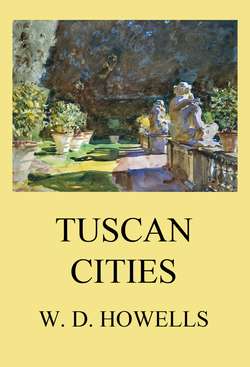Читать книгу Tuscan Cities - William Dean Howells - Страница 19
На сайте Литреса книга снята с продажи.
XVI
ОглавлениеThe savage lurks so near the surface in every man that a constant watch must be kept upon the passions and impulses, or he leaps out in his war-paint, and the poor integument of civilization that held him is flung aside like a useless garment The Florentines were a race of impulse and passion, and the mob was merely the frenzy of that popular assemblage by which the popular will made itself known, the suffrage being a thing as yet imperfectly understood and only secondarily exercised. Yet the peacefulest and apparently the wholesomest time known to the historians was that which followed the expulsion of the Duke of Athens, when the popular mob, having defeated the aristocratic leaders of the revolt, came into power, with such unquestionable authority that the nobles were debarred from office, and punished not only in their own persons, but in kith and kin, for offences against the life of a plebeian. Five hundred noble families were exiled, and of those left, the greater part sued to be admitted among the people. This grace was granted them, but upon the condition that they must not aspire to office for five years, and that if any of them killed or grievously wounded a plebeian, he should be immediately and hopelessly re-ennobled; which sounds like some fantastic invention of Mr. Frank R. Stockton's, and only too vividly recalls Lord Tolloller's appeal in " Iolanthe ":—
" Spurn not the nobly born
With love affected,
Nor treat with virtuous scorn
The well-connected.
High rank involves no shame —
We boast an equal claim
With him of humble name
To be respected."
The world has been ruled so long by the most idle and worthless people in it, that it always seems droll to see those who earn the money spending it, and those from whom the power comes using it. But we who are now trying to offer this ridiculous spectacle to the world ought not to laugh at it in the Florentine government of 1343-46. It seems to have lasted no long time, for at the end of three or four years the divine wrath smote Florence with the pest. This was to chastise her for her sins, as the chroniclers tell us; but as a means of reform it failed apparently. A hundred thousand of the people died, and the rest, demoralized by the terror and enforced idleness in which they had lived, abandoned themselves to all manner of dissolute pleasures, and were much worse than if they had never had any pest This pest, of which the reader will find a lively account in Boccaccio's introduction to the " Decamerone " — he was able to write of it because, like De Foe, who described the plague of London, he had not seen it — seems rather to have been a blow at popular government, if we may judge from the disorders which it threw the democratic city into, and the long train of wars and miseries that presently followed. But few of us are ever sufficiently in the divine confidence to be able to say just why this or that thing happens, and we are constantly growing more modest about assuming to know. What is certain is that the one-man power, forboded and resisted from the first in Florence, was at last to possess itself of the fierce and jealous city. It showed itself, of course, in a patriotic and beneficent aspect at the beginning, but within a generation the first memorable Medici had befriended the popular cause and had made the weight of his name felt in Florence. From Salvestro de Medici, who succeeded in breaking the power of the Guelph nobles in 1382, and, however unwillingly, promoted the Tumult of the Ciompi and the rule of the lowest classes, it is a long step to Averardo de' Medici, another popular leader in 1421; and it is again another long step from him to Cosimo de' Medici, who got himself called the Father of his Country, and died in 1469, leaving her with her throat fast in the clutch of his nephew, Lorenzo the Magnificent. But it was the stride of destiny, and nothing apparently could stay it.
